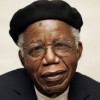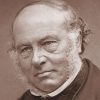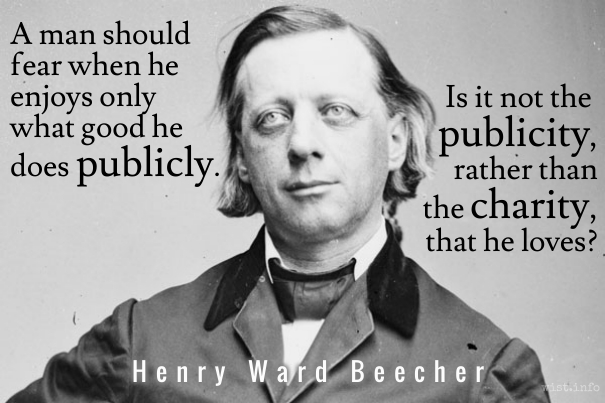Iz it charity tew giv tew a thankless cuss in need? certainly; jest az mutch az it would be to save a drouning cow.
[Is it charity to give to a thankless cuss in need? Certainly; just as much as it would be to save a drowning cow.]
Josh Billings (1818-1885) American humorist, aphorist [pseud. of Henry Wheeler Shaw]
Everybody’s Friend, Or; Josh Billing’s Encyclopedia and Proverbial Philosophy of Wit and Humor, ch. 132 “Affurisms: Chips” (1874)
(Source)
Quotations about:
good works
Note not all quotations have been tagged, so Search may find additional quotes on this topic.
Goodness is about what you do. Not who you pray to.
The time spent in praying to God, might be better employed in deserving well from him. Men think praying the easier Task of the two, and therefore choose it.
George Savile, Marquis of Halifax (1633-1695) English politician and essayist
“Religion,” Political, Moral, and Miscellaneous Thoughts and Reflections (1750)
(Source)
The benevolent and sublime reformer [Jesus] of that religion [Judaism] has told us only that god is good and perfect, but has not defined him. I am therefore of his theology, believing that we have neither words nor ideas adequate to that definition. and if we could all, after his example, leave the subject as undefinable, we should all be of one sect, doers of good & eschewers of evil. No doctrines of his lead to schism.
Thomas Jefferson (1743-1826) American political philosopher, polymath, statesman, US President (1801-09)
Letter (1819-06-25) to Ezra Styles Ely
(Source)
Were I to be the founder of a new sect, I would call them Apriarians, and after the example of the bee, advise them to extract the honey of every sect. My fundamental principle would be the reverse of Calvin’s, that we are to be saved by our good works which are within our power, and not by our faith which is not within our power.
Thomas Jefferson (1743-1826) American political philosopher, polymath, statesman, US President (1801-09)
Letter to Thomas B. Parker (15 May 1819)
(Source)
To me, good works are more important than theology. We all know that religion has been historically, and still is today, a cause of great evil as well as great good in human affairs. We have seen terrible wars and terrible persecutions conducted in the name of religion. We have also seen large numbers of people inspired by religion to lives of heroic virtue, bringing education and medical care to the poor, helping to abolish slavery and spread peace among nations. Religion amplifies the good and evil tendencies of individual souls. Religion will always remain a powerful force in the history of our species. To me, the meaning of progress in religion is simply this, that as we move from the past to the future the good works inspired by religion should more and more prevail over the evil.
Freeman Dyson (1923-2020) English-American theoretical physicist, mathematician, futurist
“Progress in Religion,” speech accepting the Templeton Prize, Washington National Cathedral (9 May 2000)
(Source)
While we do our good works let us not forget that the real solution lies in a world in which charity will have become unnecessary.
Chinua Achebe (1930-2013) Nigerian novelist, poet, professor, critic [Albert Chinualumogu Achebe]
Anthills of the Savannah (1987)
(Source)
Believe me, it is not length of time spent in prayer that brings a soul benefit: when we spend our time in good works, it is a great help to us and a better and quicker preparation for the enkindling of our love than many hours of meditation.
Teresa of Ávila (1515-1582) Spanish mystic, poet, philosopher, saint
Foundations, ch. 5 “On Prayer” [tr. Peers]
(Source)
Alternative translations:
And let souls believe me that it is not the length of time spent in prayer that benefits one; when the time is spent as well in good works, it is a help in preparing the soul for the enkindling of love. The soul may thereby be better prepared in a very short time than through many hours of reflection.
[tr. Kavanaugh / Rodriguez]
And, believe me, it is not the length of time which makes a soul advance in prayer, but when being called to other works by obedience and charity, they do these duties well, then (as I have said) the soul advances so much, that in a very short time she is better prepared for enkindling within her the love of God, than (wanting in those works) she would be by spending many hours in meditation.
[tr. Dalton]
But believe me, what helps a soul to advance is not the spending long hours in prayer, but it is a great help to be employed also in active works, so that the soul is better disposed to enkindle its love in a very short space of time than by spending many hours in meditation.
[tr. Mason]
The Faith you mention has doubtless its use in the World. I do not desire to see it diminished, nor would I endeavour to lessen it in any Man. But I wish it were more productive of good Works, than I have generally seen it: I mean real good Works, Works of Kindness, Charity, Mercy, and Publick Spirit; not Holiday-keeping, Sermon-Reading or Hearing; performing Church Ceremonies, or making long Prayers, filled with Flatteries and Compliments, despis’d even by wise Men, and much less capable of pleasing the Deity.
Benjamin Franklin (1706-1790) American statesman, scientist, philosopher, aphorist
Letter to Joseph Huey (6 Jun 1753)
(Source)
The virtues, like the body, become strong more by labor than by nourishment.
A man should fear when he enjoys only what good he does publicly. Is it not the publicity, rather than the charity, that he loves?
Henry Ward Beecher (1813-1887) American clergyman and orator
In Henry Ward Beecher and Edna Dean Proctor, Life Thoughts: Gathered From the Extemporaneous Discourses of Henry Ward Beecher (1858)
See Matthew.
It’s no great Commendation to just forbear doing Ill: thou art bound moreover to do Good to others; if thou dost not, thou art not Good to thy self.
Thomas Fuller (1654-1734) English physician, preacher, aphorist, writer
Introductio ad Prudentiam, # 716 (1725)
(Source)
Something about the fact that I made some contribution to either my country, or those who were less well off. I think back to what Camus wrote about the fact that perhaps this world is a world in which children suffer, but we can lessen the number of suffering children, and if you do not do this, then who will do this? I’d like to feel that I’d done something to lessen that suffering.
Robert Francis Kennedy (1925-1968) American politician
Interview with David Frost (1968)
In an interview a month before he was assassinated, about how his obituary should read. See Camus.
Good Works will never save you, but you can never be saved without them.
Thomas Fuller (1654-1734) English physician, preacher, aphorist, writer
Gnomologia: Adages and Proverbs, #1738 (1732)
(Source)
I believe in one God, and no more; and I hope for happiness beyond this life.
I believe in the equality of man; and I believe that religious duties consist in doing justice, loving mercy, and endeavouring to make our fellow-creatures happy.
But, lest it should be supposed that I believe many other things in addition to these, I shall, in the progress of this work, declare the things I do not believe, and my reasons for not believing them.
I do not believe in the creed professed by the Jewish Church, by the Roman Church, by the Greek Church, by the Turkish Church, by the Protestant Church, nor by any church that I know of. My own mind is my own church.
All national institutions of churches, whether Jewish, Christian or Turkish, appear to me no other than human inventions, set up to terrify and enslave mankind, and monopolize power and profit.
Thomas Paine (1737-1809) American political philosopher and writer
The Age of Reason, Part 1, ch. 1 (1794)
(Source)
Not clamour, but love,
Not rumour but dedication,
Not violence but intelligence
Sings in the ear of God.[Non clamor, sed amor,
non vox, sed votum,
non cordula, sed cor
cantat in aure Dei]Thomas of Celano (c.1200 - c.1265) Italian friar, poet, hagiographer [Tommaso da Celano]
(Attributed)
A similar phrase -- "Not the voice but the deed, not the music of the heart but the heart, not noise but love sings in the ear of God" -- is attributed to Jordanus de Saxonia, an Augustinian hermit born in Quedlinburg in 1299.
“Be careful not to do your ‘acts of righteousness’ before men, to be seen by them. If you do, you will have no reward from your Father in heaven.
“So when you give to the needy, do not announce it with trumpets, as the hypocrites do in the synagogues and on the streets, to be honored by men. I tell you the truth, they have received their reward in full. But when you give to the needy, do not let your left hand know what your right hand is doing, so that your giving may be in secret. Then your Father, who sees what is done in secret, will reward you.
“And when you pray, do not be like the hypocrites, for they love to pray standing in the synagogues and on the street corners to be seen by men. I tell you the truth, they have received their reward in full. But when you pray, go into your room, close the door and pray to your Father, who is unseen. Then your Father, who sees what is done in secret, will reward you.”
The Bible (The New Testament) (AD 1st - 2nd C) Christian sacred scripture
Matthew 6:1-6 (NIV)
(Source)
KJV: "Take heed that ye do not your alms before men, to be seen of them: otherwise ye have no reward of your Father which is in heaven. "Therefore when thou doest thine alms, do not sound a trumpet before thee, as the hypocrites do in the synagogues and in the streets, that they may have glory of men. Verily I say unto you, They have their reward. But when thou doest alms, let not thy left hand know what thy right hand doeth: That thine alms may be in secret: and thy Father which seeth in secret himself shall reward thee openly. "And when thou prayest, thou shalt not be as the hypocrites are: for they love to pray standing in the synagogues and in the corners of the streets, that they may be seen of men. Verily I say unto you, They have their reward. But thou, when thou prayest, enter into thy closet, and when thou hast shut thy door, pray to thy Father which is in secret; and thy Father which seeth in secret shall reward thee openly."
Beautiful it is to see and understand that no worth, known or unknown, can die even in this earth. The work an unknown good man has done is like a vein of water flowing hidden underground, secretly making the ground green; it flows and flows, it joins itself with other veins and veinlets; one day, it will start forth as a visible perennial well.
Thomas Carlyle (1795-1881) Scottish essayist and historian
“Varnhagen von Ense’s Memoirs,” London and Westminster Review, No. 62 (1838-12)
(Source)
A review of three books involving Lady Rahel Varnhagen von Ense.



















